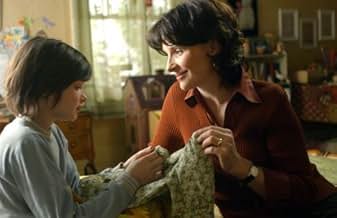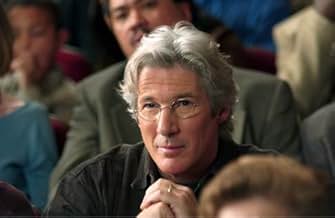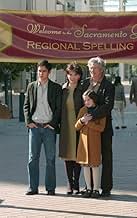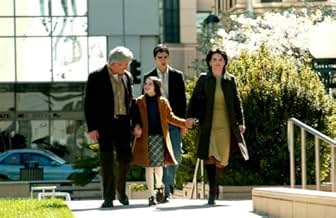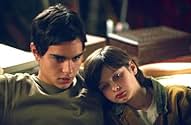रिचर्ड गेर अभिनीत यह मनोरंजक कहानी एक पिता के बारे में है जो राष्ट्रीय स्पेल्लिंग बी के लिए अपनी प्रतिभाशाली बेटी की प्रशिक्षण देने के लिए तत्पर है।रिचर्ड गेर अभिनीत यह मनोरंजक कहानी एक पिता के बारे में है जो राष्ट्रीय स्पेल्लिंग बी के लिए अपनी प्रतिभाशाली बेटी की प्रशिक्षण देने के लिए तत्पर है।रिचर्ड गेर अभिनीत यह मनोरंजक कहानी एक पिता के बारे में है जो राष्ट्रीय स्पेल्लिंग बी के लिए अपनी प्रतिभाशाली बेटी की प्रशिक्षण देने के लिए तत्पर है।
- निर्देशक
- लेखक
- स्टार
- पुरस्कार
- कुल 1 नामांकन
फ़ीचर्ड समीक्षाएं
"Bee Season" co-directed by Scott McGehee and David Siegel feels empty because the somber treatment they have given to the movie. The dark cinematography of Giles Nuttgens doesn't help either, but the musical scores of Peter Nasher works well, as a whole.
One enters the Naumann world through the sensitive Eliza, a girl much older and wiser than her 11 years indicate. It is Eliza who senses all that is wrong with her family, as it appears they are falling apart in front of her, and as a little girl, she simply can't do anything at all to bring everyone together. As a way to escape the unhappy home, Eliza immerses herself in the spelling bee contests in which she excels. Not until then, does she get the attention of her father, who supports her newly found talent.
Saul, the religious studies professor, doesn't even come aware about what's wrong with his marriage until it's too late. In fact, he is a man appears to be unable to communicate with the illusive Miriam, a woman who is deeply disturbed by what happened in her own life with the tragedy of her parents death. Saul and Miriam's marriage is over, but they don't do anything to correct the situation. Miriam's problems come to a head when she is taken away and makes Saul confront the many issues that he probably never dealt with before.
Aaron, the older son, is rebelling against his own religion. He needs to experiment with other beliefs because he is at that stage of his life in which he is trying to find out who he is. That is why when he meets Chali, the young Hare Krishna follower, he decides to follow her in his quest for finding a guidance for his life.
The ensemble playing is dominated by the youngest cast member, Flora Cross, who makes a luminous Eliza. Her expressive eyes and her intelligence tells everything about her. Juliette Binoche's Miriam is a puzzle. Richard Gere does what he can with Saul and Max Minghella has some good moments as Aaron. Kate Bosworth is seen briefly as Chali.
"Bee Season" is a difficult film to sit through because it is a dark look into a family falling apart without a safety net. Also, the way the film has been promoted gives a false impression about its content.
Saul is close to his musically gifted son Aaron (Max Minghella) with whom he shares a love of music but ignores his 11-year old daughter Eliza (Flora Cross) until her talent for spelling is recognized and she wins local and regional spelling bees. He takes advantage of the opportunity to become closer to her by training her for the national championship and encouraging her to explore the mystical states that he only relates to conceptually. He sees in Eliza the potential to put into practice the teachings of the Kabbalah scholar Abulafia that enlightenment can be achieved through alignment of letters and words. He tells her that "many cultures believe that letters are an expression of a special, powerful energy; that when they combine to make words, they hold all the secrets of the universe." Yet as Eliza and her father delve further into their studies, they forget to look around and see that the people around them are in trouble.
Aaron rejects his father's teachings and turns to Hinduism at the encouragement of a young woman named Chali (Kate Bosworth). He pretends to go on a weekend camping trip but instead dons orange robes and spends the time at a retreat for Hare Krishna followers, much to his father's displeasure. Unfortunately, the story treats his decision to explore a different faith as an adolescent lark rather than a legitimate spiritual quest and we never discover his true reasons for his interest. Meanwhile, Saul's wife Miriam (Juliette Binoche) has flashbacks of a car accident that killed her parents. She takes the phrase Tikkun Olam "to repair the world" - literally and steals small glittering objects from people's homes in order to reconstruct the world but her own world begins to spiral downward. The sub-plots are not well developed however, and the characters' behavior is insufficiently motivated to be plausible.
The heart of the film lies in the transformation that is taking place within Eliza, dramatized in the spelling bee competitions. Although she has never seen or heard of a particular word before, she is able to visualize it in different ways by concentrating with her eyes closed, depicted on screen by clever special effects. We follow the gifted speller as she moves through one competition after another and marvel at how she is able to remain centered while the world around her is crumbling. The acting is credible and Cross is a promising newcomer but Gere emotes too much personal warmth and "star quality" to be fully convincing as a self-centered, emotionally detached Jewish scholar.
Bee Season has a potent message in so far as it celebrates an individual's use of personal power to alter their experience of reality. The filmmakers, however, fail to clarify what the film is trying to say. Various threads compete for attention: Eliza's personal experiences of God, Saul's Kabbalistic teachings, Aaron's turn to Eastern religion, and Miriam's sickness, but none are sufficiently developed to make a coherent statement. Even the ending that is supposed to bring some resolution leaves us scratching our heads. Bee Season is a well-intentioned film that tackles an important subject but ultimately fails to fully explore the depth of its characters or the true meaning of its message, and I found its suggestion that a family can love God but not each other to be incongruous.
This movie is powerful because it details, much more authentically than films like "Ordinary People" and "American Beauty", the way a family can start out with the hopes of happiness and the grasp toward achievement, community, and fulfillment, but end up discovering what, alas, we all discover eventually- that our need for control and refinement and altering others' lives often leads to ours and their unhappiness. "Bee Season" also evokes the need of God in our lives- in whatever way we define that, whether it be religious community, personal spirituality, or deep connections to others. Mostly, the message of this film seems to be that spirituality, as Saul defines it, often disconnects and alienates, rather than connects and fulfills. Oftentimes the little embraces and big love we give to our families and friends on a day-to-day basis constitute divinity in our lives.
A+...Powerful...You don't want to miss it.
The film blends a family drama with two popular interests, the Kabbalah and spelling bees. Unfortunately, the gimmicky celebrity populism of the former is accentuated with the wincible casting of Richard Gere as the father who is supposed to be a Talmudic scholar with a dissertation on Jewish mysticism.
When he was shown giving a simplistic lecture at multicultural UC Berkeley on the theme of tikkun olam (repairing the world) that is echoed throughout the film, I felt the only way I could accept him in the role at all would be to assume he was a gentile intro to comparative religion teacher, even though he has lines denigrating Jews who chant Hebrew in synagogue without understanding the language and about inspiring his French Catholic wife to convert. He does put across well how the patriarch bullies the family emotionally and controls them with food, rigid standards and attention, like a more subtle Great Santini, but he lacks the pale intensity of the obsessed and just seems another NPR-listening, Bach-duet playing intellectual.
Until the involving climax, though, there are ironically very little Hebrew numbers as letters to guide the secrets of the universe in the movie when the dad takes his spelling wunderkind daughter under his wing to teach her the power of language, but it does lead to the most powerful scenes in the film of letting us see what's going on inside her head. Flora Cross in her debut is the anti-Dakota Fanning in absolutely convincing us that she is in thrall to a supernatural gift and that her kabbalistic studies, which are usually forbidden to young people for their psychological dangers, are opening her up to hidden reservoirs of perception. It is completely exceptional that special effects can be so extraordinary and important to an intellectual family story, but they are not only enchanting but demonstrative. Cross naturally communicates how she intuitively is in touch with a force that her father can only enthusiastically theorize and not quite capture himself.
The sharp editing is superb at clarifying cross-currents from the book, and perhaps making it much easier, perhaps a bit too simplistically, to see how each member of the family is seeking the face of God in their own way. The son, dark heart throb in the budding Max Minghella, is, as usual, seduced by a bland blonde shiksa, Kate Bosworth, though with an unusual rebellious religious twist that here seems natural to the Berkeley environment. But then his Jewish religious education seemed pretty random.
The editing and the special effects also marvelously contrast the paternal theme with the other fractured visual theme of the kaleidescope that the mother favors. While Naomi Foner Gyllenhaal's adaptation (and it's nice to see Maggie and Jake's mom's work again) makes the details of the mom's increasingly disturbed activities more incomprehensible than in the book, Juliette Binoche superbly adds a fragility and depth to the role beyond the novel and makes her heartbreakingly sympathetic.
The conclusion is more emotional, if more pat, than in the book, though some interpretation is still possible.
In making the intellectual visible, the film also uses library settings as an inner sanctum very warmly.
Nice to hear the band Ivy on the soundtrack and over the credits.
क्या आपको पता है
- ट्रिवियाDakota Fanning was originally supposed to play Eliza, but directors selected Flora Cross because she looked so much more like Juliette Binoche.
- गूफ़The license plates on the family Volvo are different on the front and back. The front license plate starts with a "4", the rear license plate starts with a "5".
- भाव
Saul: There are people who believe that letters are an expression of a very special primal energy and when they combine to make words they hold all the secrets of the universe...
Saul: Remember the Vikings?
Saul: [Takes a green apple] OK, Vikings called this "aepli".
Saul: Now when they took it across the sea in their ships it became "apfel".
Saul: Crossed another border, it became "appel".
Saul: By the time it got to us it was "apple".
Saul: Its spelling contains all of that.
Saul: It holds its history inside it.
- कनेक्शनFeatured in At the Movies: एपिसोड #2.41 (2005)
- साउंडट्रैकPartita in B Minor BWV 1002 Sarabande
Written by Johann Sebastian Bach
Arranged by Peter Nashel and Patrick Zimmerli
Performed by Tim Fain and Inbal Segev
टॉप पसंद
- How long is Bee Season?Alexa द्वारा संचालित
विवरण
- रिलीज़ की तारीख़
- कंट्री ऑफ़ ओरिजिन
- आधिकारिक साइट
- भाषाएं
- इस रूप में भी जाना जाता है
- Umut mevsimi
- फ़िल्माने की जगहें
- उत्पादन कंपनियां
- IMDbPro पर और कंपनी क्रेडिट देखें
बॉक्स ऑफ़िस
- बजट
- $1,40,00,000(अनुमानित)
- US और कनाडा में सकल
- $11,80,560
- US और कनाडा में पहले सप्ताह में कुल कमाई
- $1,20,544
- 13 नव॰ 2005
- दुनिया भर में सकल
- $68,56,989
- चलने की अवधि1 घंटा 44 मिनट
- रंग
- ध्वनि मिश्रण
- पक्ष अनुपात
- 2.35 : 1
इस पेज में योगदान दें









